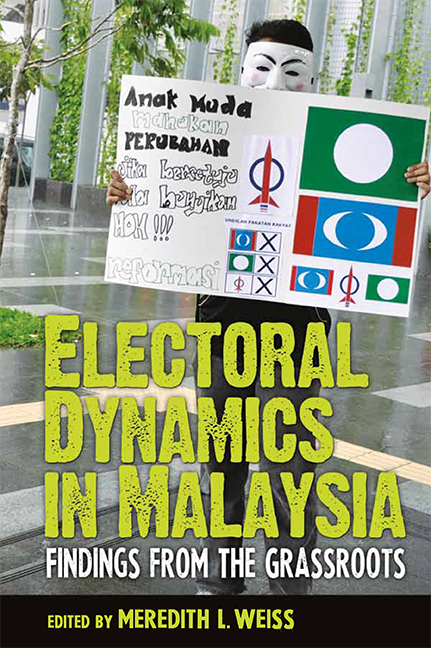Book contents
- Frontmatter
- Contents
- List of Tables
- Foreword
- Acknowledgements
- Glossary & Acronyms
- Chapter 1 Introduction: Patterns and Puzzles in Malaysian Electoral Dynamics
- Chapter 2 Arau, Perlis: The Irresistible Charm of Warlords, Women and Rewards?
- Chapter 3 Padang Serai, Kedah: Between the ‘Personal Touch’ and the Generous Hand
- Chapter 4 Kuala Nerus, Terengganu: New Malay Politics?
- Chapter 5 Balik Pulau, Penang: Home Run for the Home Boys
- Chapter 6 Lumut, Perak: Patronage, Clientelism and the Post-Coup Order
- Chapter 7 Kuantan, Pahang: Revealing the Ordinary
- Chapter 8 Pandan, Selangor: New Electoral Dynamics in Urban Malaysia
- Chapter 9 Kepong and Titiwangsa, Kuala Lumpur: Messages or Money?
- Chapter 10 Rembau, Negeri Sembilan: Personalities and Promises
- Chapter 11 Pulai, Johor: A Tale of Two Coalitions
- Chapter 12 Gelang Patah, Johor: Did Lim Kit Siang Truly Win His Last Gamble?
- Chapter 13 Kota Marudu and Keningau, Sabah: Personality, Patronage and Parochial Politics
- Chapter 14 Tuaran, Sabah: Party Loyalty and Rational Voting
- Chapter 15 Kota Kinabalu, Sabah: BN Loses Its ‘Fixed Deposit’
- Chapter 16 Beaufort, Sabah: Whither Lajim's Popularity?
- Chapter 17 Sibu and Lanang, Sarawak: Defeat of the Bosses
- Contributors
Chapter 16 - Beaufort, Sabah: Whither Lajim's Popularity?
Published online by Cambridge University Press: 10 November 2017
- Frontmatter
- Contents
- List of Tables
- Foreword
- Acknowledgements
- Glossary & Acronyms
- Chapter 1 Introduction: Patterns and Puzzles in Malaysian Electoral Dynamics
- Chapter 2 Arau, Perlis: The Irresistible Charm of Warlords, Women and Rewards?
- Chapter 3 Padang Serai, Kedah: Between the ‘Personal Touch’ and the Generous Hand
- Chapter 4 Kuala Nerus, Terengganu: New Malay Politics?
- Chapter 5 Balik Pulau, Penang: Home Run for the Home Boys
- Chapter 6 Lumut, Perak: Patronage, Clientelism and the Post-Coup Order
- Chapter 7 Kuantan, Pahang: Revealing the Ordinary
- Chapter 8 Pandan, Selangor: New Electoral Dynamics in Urban Malaysia
- Chapter 9 Kepong and Titiwangsa, Kuala Lumpur: Messages or Money?
- Chapter 10 Rembau, Negeri Sembilan: Personalities and Promises
- Chapter 11 Pulai, Johor: A Tale of Two Coalitions
- Chapter 12 Gelang Patah, Johor: Did Lim Kit Siang Truly Win His Last Gamble?
- Chapter 13 Kota Marudu and Keningau, Sabah: Personality, Patronage and Parochial Politics
- Chapter 14 Tuaran, Sabah: Party Loyalty and Rational Voting
- Chapter 15 Kota Kinabalu, Sabah: BN Loses Its ‘Fixed Deposit’
- Chapter 16 Beaufort, Sabah: Whither Lajim's Popularity?
- Chapter 17 Sibu and Lanang, Sarawak: Defeat of the Bosses
- Contributors
Summary
Introduction
In Malaysia's 13th general election on 5 May 2013, voters denied the ruling Barisan Nasional (BN) coalition the two-thirds majority of seats it sought in the parliament. Although states across Peninsular Malaysia contributed seats to Pakatan Rakyat, Sabah proved its value overall as a ‘fixed deposit’ to the BN, contributing twenty-two federal seats to ensure the ruling coalition's return to power with a simple majority. Among the federal seats won was Beaufort. Considered one of the ‘hottest’ seats in Sabah, Beaufort saw a three-cornered fight among the Barisan Nasional, represented by Azizah Mohd Dun; Lajim bin Haji Ukin, a former incumbent and ex-United Malays National Organisation (UMNO) member, for Parti Keadilan Rakyat (PKR); and Guan Dee bin Koh Hoi on the State Reform Party's (STAR) ticket.
Given Lajim's popularity as well as his reputation for benevolence among the constituents here, the campaign in Beaufort really centred around him and the intense fight between the Barisan Nasional and PKR. Lajim has been long a prominent politician, albeit labelled as a ‘frog’ since he jumped from Parti Bersatu Sabah (PBS) in 1994 to join UMNO. His and several other PBS defectors' betrayal led to the downfall of PBS and the rise of UMNO in Sabah. However, Lajim maintained his ability to defend his seats in every election he has contested since then – in 1999, 2004 and 2008 – under UMNO. This time, running under PKR, he won the state seat of Klias but very narrowly lost to his main rival from Barisan Nasional, Azizah, for the parliamentary seat.
The micro-politics of the campaign in Beaufort constituency, and specifically of Lajim's partial win, sheds light on intertwined factors such as clientelism, the ‘3 Ms’ (money, media and machinery) said to benefit the BN, the politics of development and the role of personality. Ultimately, though, the results suggest that the majority of voters voted on the basis of party and not individual; convincing promises of development outweighed the influence of even a strong and enduring clientelist network.
- Type
- Chapter
- Information
- Electoral Dynamics in MalaysiaFindings from the Grassroots, pp. 223 - 234Publisher: ISEAS–Yusof Ishak InstitutePrint publication year: 2013

